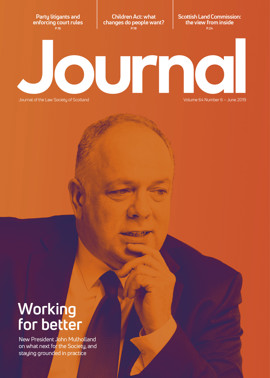Dear employer...

How could employers be better supporting your mental health?” This was the question we, a group of trainees and recently qualified solicitors, were posed at a round table during Mental Health Awareness Week, hosted by two charities working closely with mental health. We formed a mixed group of high street, in-house and big firm employees. We weren’t brought together to have a moan or form a support group, but instead focused on progress.
Give managers the right training to support us
Manager training was the central conversation that underpinned almost everything we talked about, and is a running theme throughout this letter. A manager’s behaviour can make or break morale, set the tone for the workplace and impact everything from reward to rebuke. Our managers are possibly the single biggest influences on our lives at work.
We all know from experience that being a senior lawyer with great legal skills won’t automatically make you a good manager. Supervising trainees and more junior members of staff needs specific training.
Arguably, the most important part is pastoral support and understanding how to speak to your team, be empathetic, show mutual respect, demonstrate trust and address wellbeing at work openly.
Respect our work
The fact that “psychological safety” immediately emerged as a key theme shows that there is a common problem when it comes to respecting more junior members of staff.
This essentially means feeling safe at work: feeling safe that you won’t be embarrassed in front of your colleagues if you make a mistake, or shamed for needing to leave at 5pm. Verbal abuse, including swearing, is rife; this should be acknowledged as the bullying it is.
“Humiliation”, “bullying” and “shame” were all words discussed by the group: is this how we want to describe the legal workplace?
When we talked about perceptions we had before we started our traineeships, the common themes were that “we would be worked to the bone; we were grateful to have a job so would do anything; we hoped to avoid the worst”. We don’t want to feel like the traineeship is a survival test, but this initiation-like mindset perpetuates stress, long hours, machismo and demeaning tasks. This attitude is wrong, given what we know about the importance of positive mental health in the workplace.
In the room, tasks we had carried out ranged from a weekly roll run involving seven different shops and picking up a partner’s kids from school, to taking a urine sample to the doctor for a senior manager and having to draft a college application for colleague’s child. These are not jobs trainees should be expected to undertake, and instead demonstrate a lack of respect.
People will either naturally absorb cultures from their managers, so this behaviour will be self-perpetuating, or they’ll just leave. Managers need to work hard to break this cycle and foster a supportive place for people to learn.
Be on our side
Invest your time in understanding our wellbeing. Get to know your team and how we manage our workload, how we prefer to work and what it looks like if we start to burn out and push ourselves too hard. Make sure there are mechanisms to reallocate work if staff are overloaded.
Be on our side. When it comes to answering to clients, we know that relationships can be of huge value, but aren’t your staff valuable? Are there occasions when, to be a responsible manager, you should start pushing back on unreasonable client deadlines and requests?
We are not just employees in your workplace
For some people, being available on demand is less of an issue as they live and breathe their jobs – but that should be a choice. We have interests outside work, families, holidays and obligations. Encouraging staff to enjoy their holidays is so simple, but the group shared their experiences of having to be available on phone and email, having to move planned holidays and even having annual leave cancelled an evening before a week abroad was planned.
People will flourish so much more at work if they are enjoying their lives in a wider sense. Constantly prioritising career has become a stipulation of the legal profession and does, and will continue to, drive people away.
Billable hours and time recording take this issue to a new level. These systems work under the assumption that any of us can turn up to work day after day and perform at 100%, totally unaffected by whatever else might be going on in our personal lives or how we might be feeling. We know there is a reason we use time management systems, but employers can help by making sure it’s not a way to promote presenteeism and that a human empathetic element can override the objectivity.
One of the worst examples we shared was in the months following a family bereavement. A senior lawyer was addressing a period when a colleague’s focus and recorded time had maybe dipped as a result, and said simply: “You should be over that by now.” Trust us as your colleagues to know that something might be going on if there is a performance issue, and be respectful of our private lives. Most importantly, speak to us about it as another person and not simply as a “resource”.
Trust us to work flexibly
Trying harder to embed flexible working can help balance work and private life. We live in an age not only when the technology allows us to adopt more agile working, but also when employees have obligations that clash with the traditional nine-to-five model, whether that is collecting children from school or attending a dentist appointment.
It seems to be a lack of trust again that is preventing flexible working from being embraced. Remember that we are enthusiastic junior lawyers, keen to develop our careers and get access to exciting work – what’s the incentive not to get the job done or make up missed time? We are not suggesting there should be no oversight of staff attendance, but we must find a way for flexible working not to be looked down on but valued as a norm.
In summary
We discussed that we shouldn’t be the ones sitting around this table, trying to effect change from the bottom – it’s frustrating, though hopefully not futile. Ultimately, though, we are the future of the profession, so in time we will embed better ways of working to make the legal profession healthier.
Hopefully we won’t have to wait that long if you, as employers, are prepared to buy in. You can accelerate the process by challenging behaviours, implementing policies and investing in your staff’s mental health. There’s a danger that if you don’t, we will stop attracting people to the profession due to that fear of being worked to the bone, or some new lawyers will invariably start to leave.
Have your say
The Law Society of Scotland, in partnership with See Me, is currently running a survey to understand the landscape of mental health in the legal profession. This is your chance to share your experiences and opinions anonymously. The survey, at www.lawscot.org.uk/wellbeing/, is open to solicitors, accredited paralegals, paralegals, legal technicians, and all support staff working at law firms and in-house legal teams, until 30 June 2019. We should all use this opportunity to be heard and generally, going forward, the fundamental action we can take from the round table is that we need to keep talking about mental health.
Perspectives
Features
Briefings
In practice
- Tradecraft – one solicitor's experience
- Dear employer...
- Team building – for the Foundation?
- Accredited paralegal practice area highlight: conveyancing
- Accredited Paralegal Committee profile
- What's new for paralegals?
- Ask Ash
- Managing the risk of workplace stress
- Appreciation: Iain Alexander Macmillan
- Revealed – by your AML certificates






